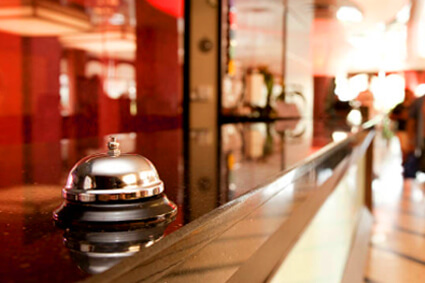Introduction
The rapid growth of Airbnb showed the hotel industry that competition is not only alive and well but also liable to appear from new areas. To achieve success in the hotel industry, you need more time to focus on customer service and marketing. Unfortunately, old-fashioned IT processes are standing in your way, even as you know that tracking your employees with identity management matters.
A simple yet effective approach to hotel security rests on three fundamental pillars: process, technology, and people. Ultimately, an easy-to-understand security approach makes it easier for managers, IT, and frontline employees to keep guests safe. Let’s start by looking at people’s needs first.
People First: Your Greatest Security Asset (or Weakness)
Unlike other businesses, hotels constantly have new people arriving and departing, including new employees and guests. Training your staff in security fundamentals matters because security is a hot topic for travellers in 2017.
The New York Times reports: “As a growing feature of the travel landscape, security threats have ushered in a range of travel practices — from easy behavioral adjustments like dressing inconspicuously to training in taking evasive action — that many experts endorse.” After a long day of being “on guard,” your guests need to feel safe once they come to your hotel.
The following people practices provide a foundation for strong security:
Include physical security and cybersecurity training fundamentals in your new employee training program.
Equip all employees (and others with access to sensitive hotel areas) with ID badges and security access.
Managers need to regularly communicate why security matters to the organization and to guests.
Process: Developing Security Habits for Your Hotel
Every year, security professionals discover security measures have been weakened or defeated due to poor processes. For example, the failure to install Microsoft updates on a timely basis contributed to the impact of the WannaCry ransomware incident in 2017. To prevent that from happening at your hotel, use the following process steps:
Audit compliance with security processes. Hotel employees tend to be focused on their primary responsibility, such as restaurant service or cleaning rooms. Unless managers regularly evaluate security compliance, mistakes are more likely.
Cancel security authorization immediately. Managers need an easy way to cancel system access for employees who leave the organization. Cancelling security access — and confirming receipt of keys and cards — needs to be part of the standard process.
Technology: Simplify Security Administration
Did you know that many organizations still keep track of security matters with notebooks and spreadsheets? While common, this manual process takes up a great deal of time, as managers must check multiple systems to verify their records are complete. In addition, senior management has no assurance that all managers are enforcing security practices in a uniform manner. In security, a catastrophic attack can happen if a single system is left unattended. As hotel competition grows, this manual approach will not do. Instead, consider using a security solution like Avatier. Make sure the security solution you choose has the following features:
- High Security Standards. Think of the difference between a highly trained Secret Service agent protecting your guests and a bored, poorly trained guard. Security systems are not created alike. Avatier’s security is U.S. military approved.
- Single Sign-On. According to the Pew Center, many Americans write down passwords on paper to manage them. That practice represents a security risk to your organization. Keep life simple for your hotel employees by giving them a single sign-on at work.
- Managing Group Access Easily. If your hotel has 50 cleaners, they probably all need the same basic security access. Therefore, there is no need to individually set up security permissions for each employee. Make sure your security solution has the ability to manage group access.
Conclusion
At the end of the day, hotel guests want to be able to sleep soundly at night. In order to do that, they need to know they are safe and secure in their rooms. If they are worried about their computers being hacked or room security, they will not have a good experience. In that way, robust security is essential to creating a relaxing, pleasant hotel experience for your guests. Is your hotel doing everything it can to provide a safe space for guests?
Further Reading on Hotel Security
Elaine Glusacmay. “Europe Beckons, But Security Consultants Urge: Be Prepared.” New York Times, May 15, 2017
Alex Hern. “How to protect your computer against the ransomware attack.” The Guardian, May 16, 2017
Pew Research Center. “Password management and mobile security.” January 26, 2017




